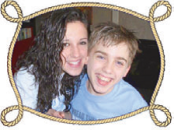SIBLING TIES BY PAIGE TALHELM
When you bug me, I’ll tell you. When you make me mad, I’ll let you know. My brother Sammy should be told too.
I was recently having a conversation with my two friends. One of these friends has a sibling with a disability and the other does not, however she is very involved in both of our (and siblings’) lives, and happens to be a dedicated volunteer for this community.
My friend (with a sibling with a disability) and I were conversing on things that drive us crazy about our siblings. Some were total brother-sister behaviors that almost anyone would be annoyed with, and some were disability specific. This is when our other friend chimed in and said, “But you can never be really mad at them.”
You can’t “not” be mad because they have a disability. As much as I love and appreciate my friend’s understanding and patience, and much as I understand Sammy might do things differently – thing is, he is still my sibling. And that comes first, before the disability. So yes, I can be mad. Frustrated. Annoyed. That’s what keeps us “normal.”
People think you have to feel bad or give them slack. There’s a difference between being real and respectful versus disrespectful and fake. I want people to give up their view of the “norms” and be okay with Sammy stimming or melting down because that is how HE deals with things. What I don’t want is people not being real and not treating him like they would anyone else. Like a human.
When you bug me, I’ll tell you. When you make me mad, I’ll let you know. My brother Sammy should be told too. The reason is that I want him to learn how to tell others to go away or leave him alone – even if he can’t speak. Just because he has autism, doesn’t mean he doesn’t get on my, or anyone else’s, nerves. And that’s okay! Getting on someone’s nerves is an everyday part of life. If you never got on someone’s nerves, I’d be concerned. Either you are holding back and not being yourself, or that person is not being real and is holding back. No one should have to hide in their own skin and hold back their true feelings.
As weird as it may sound, getting on someone’s nerves is probably the most “normal” thing my brother does day to day. It’s important to accept Sammy for the way he is, to be aware that he will deal with things differently than most of us. But everyone does! What’s important is how you react. If you react harshly and are insulting, then you are being belittling, disrespectful, rude, and hurtful. But if you react reasonably and address your thoughts respectfully, then you are treating Sammy like every other person.
Which is something that I will always admire about siblings. Every sibling has their own unique and special connection. I recently heard someone say, “Their brother is really dealing with everything so well in comparison to other siblings I’ve seen.” While I understand where this person was coming from, I don’t completely agree with the thinking. How you react to something that is considered difficult should never be rated on a scale. It should never be graded or decided as acceptable or not acceptable.
When I deal with my brother, my first thought isn’t, “I wonder what other people think about this.” My first thought is – there is no first thought – he is my brother, so I react automatically. However, if I do stop to think, my first thought is, “hat is going to make this situation okay for him and for me?” At the end of the day, I have to take care of myself and I have to accept what autism is. I’m not saying I put myself before Sammy. I’m saying that my reactions are based on our sibling connection before anything that has to do with him having autism.
My other brother and I have very different relationships with Sammy. That is how it is supposed to be. Neither of us is “dealing with” autism in a “better” or “worse” way. We’re just being Sammy’s sibling. That’s what we are. •

SIBLING TIES
Paige Talhelm, 23, lives in the Baltimore area and will begin pursuing her Master’s degree in Education of Autism & Pervasive Disorders at Johns Hopkins this coming fall. She is currently a Director at PALS Programs, an advocate for The Next Step Programs, and leads a support group for siblings of individuals with disabilities. She is the older sister of two brothers, Sammy and Jack. Sammy, 17, has autism, is non-verbal, and is not toilet trained. He is the sole reason for Paige’s push to help individuals with special needs. She hopes to one day create a program for Autism treating adults over 21 with job searching, continuing education, learning life skills, and to increase their independence. Read more about Paige’s life as a sibling of autism on her blog: www.sammyssister.weebly.com

